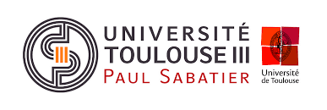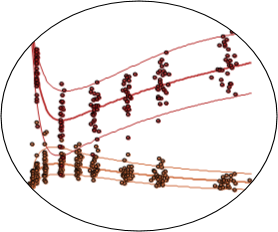

|
|||||
|
|||||
| Keywords : Pharmacokinetics (PK), Pharmacodynamics (PD), Modelling, Statistics, Programming, Data analysis, Drug Development, Precision dosing | |||||
| BACKGROUND | From drug development to dose individualization in clinical settings, model-informed approaches have become essential to solve dose optimization issues. The aim of this Master Degree is to teach the statistical, pharmacological and programming basics necessary to understand, build and take advantage of PK/PD models. |
||||
| OPEN TO | Master 1 students with a background in pharmacology, mathematics, statistics Pharmacy students (6th-year Industry branch) Pharmacy residents (i.e. Interne en Biologie Médicale, Pharmacie Hospitalière, et Innovation Pharmaceutique et Recherche) and Medical residents Medicine Veterinary students : Last year of specialization French or International candidate with equivalent background |
||||
| PRACTICAL | Calendar: Starting in September 2022, Duration 1 year European credits: 60 ECTS Teaching language: English Organization: Alternating training (Formation en alternance) |
||||
| OPPORTUNITY | Possibility to apply for a Ph.D. in Pharmacometrics Career: Pharmacometrician in |
||||


|
||
| PROGRAM | SEMESTER 1 -30 ECTS | |
| Analyzing individual PK data (6 ECTS) Linear PK concept ; Model-dependent analysis : main models, mathematical concepts ; NCA (non-compartmental analysis) ; « Two-stage approach » and clinical trials ; Patients with impaired renal or hepatic function, elderly, pediatrics, drug-drug interactions ; Analytical issues : assay validation ; PK and drug regulatory (human and veterinary drugs) : Bioequivalence ; Applied exercises : Personal tasks |
Pre- & Post-Processing (3 ECTS) Pre-processing ; Data management ; Building of dataset ; Post-processing / data science ; Applied exercises : models evaluations, goodness-of-fit (R) ; Data simulations |
|
| Population PK analysis (6 ECTS) Concepts and methodologies in POP-PK ; Use of NONMEM, MONOLIX, R (tutorial classes) ; POP-PK applied to Therapeutic Drug Monitoring, medical imagery ; Applied exercises : Personal tasks ; Machine learning applied to PK |
Physiologically-based PK (3 ECTS) Principles of PB/PK ; Applications of PB/PK : interspecies extrapolations, in vitro/in vivo extrapolations ; Building a PB/PK model from physiological parameters and drug characteristics ; Simulations and interpretations |
|
| PK/PD modelling (6 ECTS) Pharmacodynamics ; Building of PK/PD models ; PK/PD analysis of data : applied exercises ; PK/PD workshop |
Application of PK/PD (3 ECTS) Regulatory for human and veterinary drugs : bioequivalence ; Veterinary drugs ; PK/PD of antibiotics ; PK/PD in oncology |
|
| Project development (3 ECTS) |
||
| SEMESTER 2 - 30 ECTS | ||
| TEACHERS | Sarah Baklouti, Cécile Bon, Alain Bousquet-Mélou, Étienne Chatelut, Didier Concordet, Philippe Cremades, Cedric Dray, Aude Ferran, Peggy Gandia, Marlène Lacroix, Félicien Le Louedec, Fabienne Thomas, Alexis Viel, Mélanie White-Koning, Jean-Baptiste Woillard | |
| CONTACT | Chairmen and contact: Application: eCandidat (https://ecandidat.univ-tlse3.fr/) |
|
